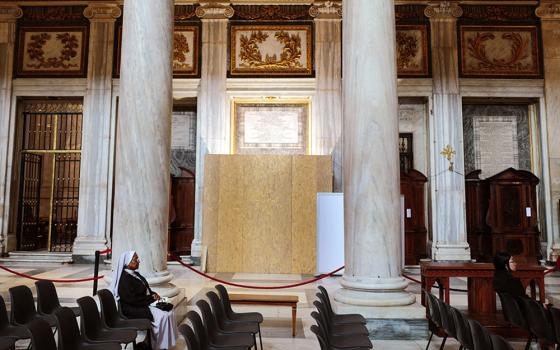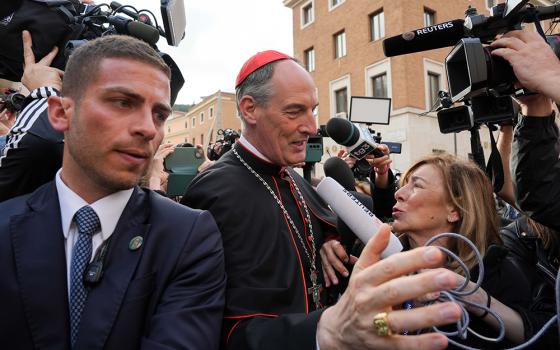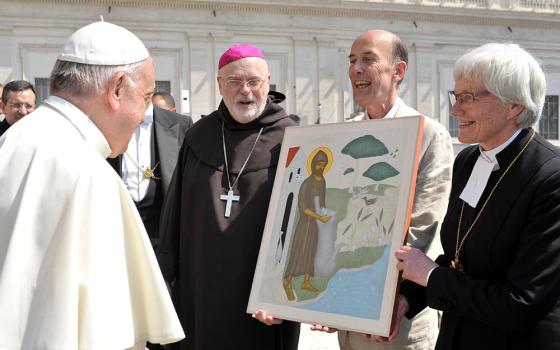Earlier this year, I was frustrated that some commentators were taking swipes at the Obama administration because, at times, its representatives spoke of freedom of worship instead of freedom of religion. Of course, Franklin Roosevelt and others had used the two terms interchangeably. More importantly, I thought this focus on semantics reeked of the kind of conspiracy thinking one finds on the right these days, and that such conspiracy thinking would harm, not help, what I believe are the Church’s very legitimate concerns about the narrow exemptions in the HHS mandate, exemptions that really do draw a distinction between worship and religious practice in ways that are decidedly harmful and decidedly anti-Catholic.
A friend told me that James Madison was the first to insist on freedom of religion and not merely freedom of worship and that I could find an examination of this fact in a book by Judge John Noonan, “The Lustre of Our Country: The American Experience of Religious Freedom.” I have been a big fan of Noonan ever since his magnificent Laetare Address at Notre Dame in 2009. So, I dashed to the library and got the book. My friend was wrong, by the way, about Madison distinguishing between worship and religious practice. The distinction Madison drew was between mere toleration of diverse religions and a more embracing commitment to free exercise. But, the rest of the book fascinates and I highly recommend it to readers. (And, while I must return this copy to the Catholic University library, I should like to have a copy in my personal library, and Christmas is coming!)
Noonan is unblushing in his praise for Madison, whom he refers to as JM throughout the text. After discussing JM’s 1785 Memorial and Remonstrance on religious freedom, and his work on the Bill of Rights as a member of the first Congress, Noonan writes that, “The radicalness of JM…was to suppose that each individual has a zone in which he or she responds to the voice of God, a zone beyond political authority.” Madison had even supported the right of conscientious objection from war, a position he could not get his fellow members of Congress to support. The issue of conscientious objection highlighted the concern about an overbroad right to religious freedom: If any man can be free from his civil obligations by citing his religious conscience, could not every man become a law unto himself? This has remained the fundamental tension in all subsequent treatment of the extent of religious freedom. Noonan writes that Madison was not so worried about the commonwealth breaking into atomized, conscience-claiming individuals incapable of governance. Madison was, in Noonan’s estimation, “confident, after all, that the voice of God would not often be heard in distorted or eccentric ways.” Madison, of course, was wrong about that, though it is difficult to fault him for failing to foretell the distortions of, say, Joel Osteen, or the eccentricities of, say, Jim and Tammy Faye Bakker. But, the problem is deeper as we will get to in a moment.
Madison’s commitment to religious freedom did admit certain limits, not on individual conscience, but on the corporate rights of the Church, an admission that, to my mind, is also at the heart of the
The “concept of church unity” is not important to us because it had been found in Europe. It is important to us because it is found in the Gospels. Ut unum sint. Indeed, the whole Reformation project, with its hostility to “priestcraft” and insistence on the right, and the capacity, of each individual to read the Scriptures for themselves and come to their own conclusions, this whole project most definitely entails a “denial of the objectivity of truth” even if it was not so intended. Certainly, for the founders’ generation, the language of the country whigs, with its conflation of civil and ecclesiastical liberties and its arch-hatred of “priestcraft,” this language had deeply affected Madison. So, too, his experience of multiple denominations further reinforced his conviction that indifferentism was not a problem. Reading Noonan’s treatment of Madison memoranda on limiting the right of a church to own property, I could not help but recall that the conservatives at Vatican II who opposed the Decree on Religious Liberty not without reason focused their concern on the danger they called laicism.
Noonan writes: “Public argument is not the same as personal conviction. But public argument that employs religious belief for its own ends, that makes ‘an Engine’ of religion, precisely parallels the exploitation of religion by government that JM denounced in the memorial as wickedness.” Noonan is on to something here. No one likes the clergy telling us how to vote. And, we should all be suspicious of politicians who traffic in religious idioms in ways that are coarse and hoary. To take a contentious issue, we may hold the personal conviction that abortion is a great evil but be unsure how to make a public argument about it. As Michael Gerson notes in his column today about the movie Lincoln, “While justice is not defined by a majority, it can’t be pursued without support from the majority.”
But, Noonan is also missing something. Religious belief may not be “employed” and treated as a hired hand for politicians, religious belief is, for most of us, the ground upon which we stand, the well from which we draw the deepest meanings of the words and ideas with which politics concerns itself: the human person, justice, the common good, rights. This is why Mario Cuomo’s position on abortion, which has been followed ever since by most Catholics on the left, is so unsatisfactory. You can’t say, “I am personally opposed to abortion because I accept my churches teachings but I do not wish to force my views on others.” If you believe that abortion is a horror, have you no obligation to act? I think that what Cuomo was getting at was what Gerson is getting at: Cuomo understood what justice for the unborn demanded but could not see a way to garner majority support to pursue such justice. But, this, too, fails unless the politician at the very least tries to publicly convince people of the rightness of his or her views that a horror is taking place. Democratic theory, and political practice, may permit a claim on Cuomo’s vote and even on his veto, but it has no claim on his voice. I do not think Noonan adequately addresses the downside of drawing to large a distinction between public argument and personal conviction.
Noonan then provides a delightful and friendly critique of de Tocqueville that he pens in the name of a fictional younger sister of Alexis who accompanied him on his journey and is now filling in what her brother left out. As a literary device, it works brilliantly. In this voice, Noonan cites the fact that “Americans are primarily practical” as one of the reasons Americans have no religious wars, or wars that never get beyond the ballot box and the courts. Noonan, in the guise of Mlle de Tocqueville, quotes an American ambassador to France explaining, “In the depths of their [the Americans’] souls they have a pretty decided indifference to dogma. One never talks about that in the churches. It is morality with which they are concerned.” It may have been possible to think such a reduction of religion to ethics was unproblematic, even a godsend for civil peace, in the early days of the Republic, although conflicting views on the morality of slavery were already forming dark clouds on the nation’s political horizon.
Today, the cost of reducing religion to ethics is – or should be – too obvious to require an argument. Yet, man of my conservative friends still quote de Tocqueville approvingly when he wrote, in one of his most famous passages:
"Religion – which with the Americans never mixes directly in the government of society – must be considered as the foremost of their political institutions. For if it does not give them the taste for liberty, it singularly facilitates their use of liberty….I do not know if all Americans have faith in their religion, for who can read the depths of the human heart? But, I am sure that they believe religion necessary to the maintenance of republican institutions. This opinion is not peculiar to one class of citizen or one party but to the entire nation; one sees it in every social rank.”
This is utilitarianism. Noonan names it as such and admits the problems that will arise when multiple, divergent moralities arise and compete in ways the founders did not foresee, but with which we are all familiar now. But, Noonan, again, does not go to the next step, and discern the deeper danger. If we imbibe this utilitarian understanding of our religion, as a kind of prop for Americanism, or for social justice, or for a deeper sense of sexual morality, we come to understand religious claims in secular terms, we reduce all issues to conflicts of power, we look to the social sciences to yield answers and information, and, just so, we skirt around what is to me the central issue any religion must face: Is it true? Madison, and Noonan, and American culture generally, are a little too comfortable with the avoidance of that central question. They are content to relegate it overmuch to the private sphere, to the free competition of the sects, to the realm of the subjective. This is not primarily a diminished sense of religion, though it is that. It is a diminished sense of reason.
More tomorrow on this wonderful book.




